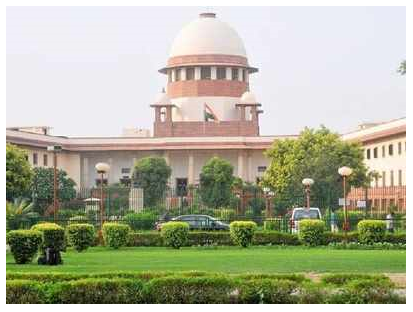- Courses
- GS Full Course 1 Year
- GS Full Course 2 Year
- GS Full Course 3 Year
- GS Full Course Till Selection
- Online Program
- GS Recorded Course
- NCERT (Recorded 500+ Hours)
- Polity Recorded Course
- Geography Recorded Course
- Economy Recorded Course
- AMAC Recorded Course
- Modern India, Post Independence & World History
- Environment Recoded Course
- Governance Recoded Course
- Science & Tech. Recoded Course
- International Relations and Internal Security Recorded Course
- Disaster Management Module Course
- Ethics Recoded Course
- Essay Recoded Course
- Current Affairs Recoded Course
- CSAT
- 5 LAYERED ARJUNA Mentorship
- Public Administration Optional
- ABOUT US
- OUR TOPPERS
- TEST SERIES
- FREE STUDY MATERIAL
- VIDEOS
- CONTACT US
ANNULMENT OF MEMBER OF PARLIAMENT
ANNULMENT OF MEMBER OF PARLIAMENT
10-07-2023

Latest Context
The election of a Member of Parliament (MP) from the Theni Parliamentary seat in 2019 was declared invalid by the Madras High Court. However, the court postponed the ruling for a month to provide time for an appeal.
What is the Background?
-
Allegations:
- According to the petitioner, he submitted Form 26 of his election affidavit, which is required under Rule 4A of the Conduct of Election Rules, 1961, without fully disclosing all of his assets and obligations.
- It was also alleged that he used corrupt tactics, such as giving out money in return for votes, in violation of section 123 of the 1951 RP (Representation of the People) Act.
- Court’s Observation: The High Court determined that Section 36 of the RP Act and the Handbook's instructions were not followed by the returning officer in charge of reviewing the nominations.
Facts about Conduct of Elections Rules, 1961
- The Representation of the People Act, 1951 in India established a set of regulations known as the Conduct of Elections Rules, 1961. These regulations set out the processes that candidates, political parties, election officials, and voters must follow when they conduct elections in the nation.
- The regulations encompass a number of electoral process elements, such as the submission of nomination papers, examination of nominations, election campaign rules, polling practises, vote counting, and election dispute settlement.
- Rule 4A: Candidates must submit an affidavit (Form 26) with their nomination papers to the returning officer in order to give a formal declaration of their assets and liabilities.
What are ‘Corrupt Practices’ under the RPA, 1951?
- Section 123 of the Act: It lists bribery, improper influence, false information, and the promotion or attempted promotion of "feelings of enmity or hatred between different classes of Indian citizens on grounds of religion, race, caste, community, or language" by a candidate in order to advance his chances in the election as examples of "corrupt practises."
- Section 123 (2): It deals with "undue influence," which is defined as "any direct or indirect interference or attempt by the candidate or his agent, or by any other person, with the consent of the candidate or his election agent, with the free exercise of any electoral right." Threats of physical harm, social exclusion, and expulsion from any caste or society might also be included in this.
- Section 123 (4): It expands the definition of "corrupt practises" to include deliberately publishing incorrect information that could sway election results. An elected representative may be disqualified under the Act's provisions if they are found guilty of a specific criminal, if they engaged in corrupt behaviour, if they fail to disclose their election-related costs, or if they have financial ties to the government.
What are the additional RPA, 1951 provisions for MP disqualification?
- He must not have been convicted of any crime that resulted in a sentence of two years or more in jail. However, being detained under a statute requiring preventative custody does not disqualify a person.
- He must not be interested in jobs, services, or contracts with the government.
- He cannot occupy a position of profit or serve as a director or managing agent for a company in which the government owns at least 25% of the stock.
- He can't have had his employment with the government terminated due to dishonesty or corruption.
- He must not have been guilty of bribery or encouraging animosity between various groups.
- He should not have been punished for advocating and engaging in social crimes like sati, untouchability, and Dowry.
What are the Judicial Observations regard to Corrupt Practices in the Past?
- Abhiram Singh v C.D. Commachen Case (2017): According to Section 123 (3) of the RPA1951, which forbids such behaviour, an election shall be declared invalid if votes are solicited in the name of a candidate's religion, race, caste, community, or language.
- SR Bommai v. Union of India (1994): Citing subsection (3) of Section 123 of the RPA, 1951, the SC declared that interfering with religion in secular activity is expressly forbidden.
- S. Subramaniam Balaji vs State of Tamil Nadu (2022): Freebie promises cannot be referred to be a corrupt practise, according to the SC. The issue has yet to be resolved, though.
Representation of the People Act 1951
-
Provisions:
- Election procedures are governed by it.
- It details what counts as eligibility for membership in the houses and what doesn't.
- It includes procedures to stop other violations and corrupt behaviour.
- The process for resolving questions and disagreements emerging from elections is outlined in it.
-
Significance:
- The act is important for the efficient operation of Indian democracy since it prohibits anyone with a criminal history from serving in representative bodies, decriminalising Indian politics in the process.
- According to the law, each candidate must disclose his assets and debts and keep track of their campaign spending. This clause guarantees the candidate's responsibility and openness about the use of public resources or the abuse of authority for personal gain.
- In order to maintain the legitimacy and free and fair conduct of elections, which is crucial for the success of any democratic setup, it forbids corrupt practises such booth capture, bribery, or fostering animosity, among others.
- By limiting eligibility for electoral bonds to political parties registered under section 29A of the RPA measure of 1951, the measure creates a framework for tracking the source of political money and guaranteeing transparency in election funding.
Must Check: IAS Coaching Centre In Delhi
PLFS 2025: Monthly Jobs Data, Bigger Survey
PLFS 2025: Monthly Jobs Data, Bigger Survey

